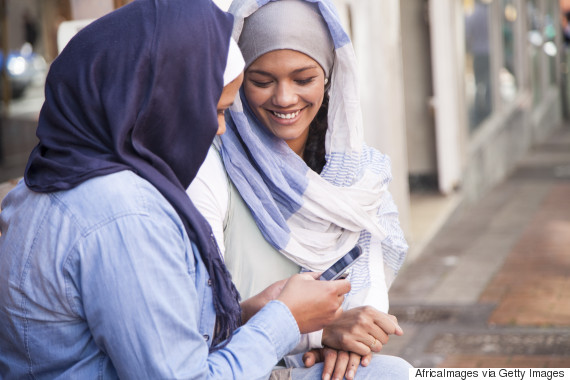He created for you mates to find tranquillity in them; and He placed between you affection and mercy ~ 30:21
Last month, CBC reported the news of an interfaith couple, Shaaz, a Muslim woman, and Jarred, a Jewish man, who live in Airdrie, Alberta. While they found a Cantor, they were unable to find an Imam for the interfaith marriage ceremony.
Muslim institution stakeholders may forbid Muslim women from marrying outside the faith. However, amongst others, Muslims for Progressive Values in the U.S and across the globe, Imam Daayiee Abdullah and Dr. Khaleel Mohammad in the U.S., Universalist Muslims and myself in Canada have offered same-sex and interfaith marriage services.

The objective of this blog is to resist juristic opinions that forbid Muslim women from marrying outside the faith. Many Muslim scholars and Imams affirm interfaith marriages of Muslim women to non-Muslim men. Ten such voices follow.
1. Khaled Abou El Fadl
According to Dr. El Fadl, the Qur’an does not expressly prohibit Muslim women from marrying men from the People of the Book, often Jews and Christians. However, past jurists argued that express permission was not given to Muslim women as it was given to Muslim men in verse 5:5.
Given the Qur’an’s silence, jurists used extra-textual reasoning to prohibit Muslim women from marrying outside the faith. They were concerned about children not being raised as Muslims and coercion on the Muslim woman to convert.
El Fadl also raises concerns about children growing up as faithless or agnostics. As such, he argues that such marriages for both men and women in non-Muslim countries, while not technically forbidden, would be makruh (detestable).
However, the category of makruh rests on human intellect as opposed to divine mandate. This indicates that the prohibition on Muslim marrying outside the faith is not textually sustained.
2. Khaleel Mohammad
The strongest case for Muslim women marrying outside the faith perhaps comes from Imam Khaleel Mohammad’s religious edict. He opines that the issue of the divinity of Jesus is moot as Muslim men were allowed to marry Christian women. Therefore, the main issue for past jurists was coercion on the Muslim woman to convert.
However, he argues that interfaith marriages can proceed based on stipulations against conversion of either spouse in the marriage legal contract. He also opines that children can make informed decisions on their own faith when they come of age.
The scholars affiliated with Imam Khaleel Mohammad also feel that the category of the People of the Book goes beyond Jews and Christians to incorporate Parsis, Hindus, Sikhs, Buddhists and atheists.
3. Asma Lamrabet
Dr. Asma Lamrabet opines that general viewpoints on interfaith marriage are not always true. She argues that the main values of marriage lie in honesty, decency and mutual respect. Her article evokes the question of cultural and nominal Muslims who identify as atheists or agnostics but get married in the Muslim community. It allows one to question the supposed marriage prohibition of Muslim women outside the faith.
4. Al Ajami
Dr. Al Ajami argues that there is no authentic Hadith that mentions the prohibition of Muslim women marrying outside the faith. He feels that Muslims are dependent on their respective social cultures and therefore do not undertake an impartial reading of the Qur’an.
He opines that verse 5:5 was a late revelation, three months before the Prophet’s death. Since the verse allows men to marry outside the faith and does not forbid women, he construes the permissibility opinion on interfaith marriage.
He juxtaposes the pagan Arabs with those who give into current day materialism. Like Lamrabet’s article, this allows raising the question that if Muslim women get married to such people, the alleged prohibition of marrying faithful non-Muslims seems absurd.
5. Hassan Turabi
The late Hassan Turabi argued that not a single word in the Qur’an or the Sunnah prohibits Muslim women from marrying outside the faith. He counselled women who converted to Islam to remain married to their non-Muslim husbands. He also opined that one can not use past juristic consensus to prohibit such marriages, as such juristic rulings were issued during times of political disputes.
6. Moiz Amjad
Moiz Amjad asserts that none of the extra-textual reasoning against such marriages is based on the Qur’an or the Prophet’s teachings. Moreover, such prohibitions are dependent on their interpretations. He concedes the possibility that prohibition to polytheists can be restricted to just the seventh century Arab pagans or it could cover Muslims deemed as heretics by other Muslims.
He opines that any socially acceptable method of marrying like through a registry office would be Islamically sufficient. Furthermore, he believes that there could be difference of opinion on the issue and that the eventual decision of interfaith marriage should be left to the Muslim woman.
7. Taj Hargey
Imam Taj Hargey opines that no Qur’anic verse bans Muslim women from marrying non-Muslim men and that Allah would have revealed express verses had that been the case.
8. Usama Hassan
Dr. Usama Hassan officiates the marriages of Muslim women outside the faith. Citing the marriage of the Prophet’s daughter Zaynab, he has refuted opinions of hardliners who want Muslim women converts to annul their marriages to non-Muslim husbands.
9. Siti Musdah Mulia
Dr. Siti Musdah Mulia opines that “the whole marital law is manmade” and that “none of it is a fax from heaven.” She is concerned that people forsake reason when it comes to religion despite the fact that the Qur’an admonishes people who fail to reason. She argues that patriarchal interpretations were inevitable as there have been very few female scholars of the Qur’an. Furthermore, she calls for Muslim interpretations in support of interfaith marriage and benefit of humanity.
10. Daayiee Abdullah
Imam Daayiee Abdullah, who officiates interfaith and same-sex marriages, sums it up well:
